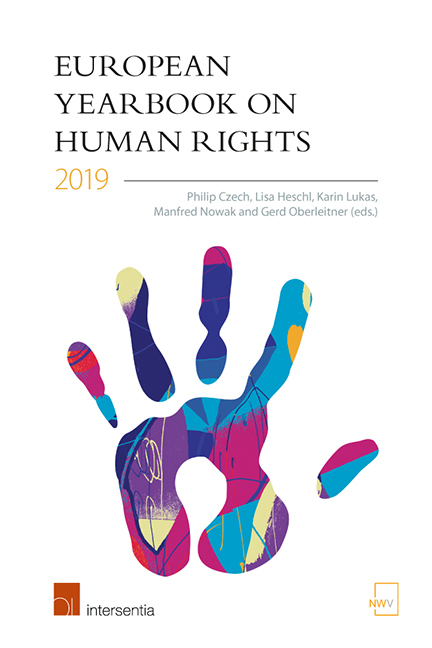Book contents
- Frontmatter
- Miscellaneous Frontmatter
- Editors’ Preface
- Contents
- List of Abbreviations
- List of Contributors
- PART I TOPIC OF THE YEAR
- PART II EU
- PART III CoE
- PART IV OSCE
- Pioneer Decision on Safety of Journalists in the Preceding Context
- If I Could I Would? International Electoral Standards and the Recommendations of Election Observers
- The Right to Political Participation of Persons with Disabilities
- The Right of Children to be Heard through Peaceful Protests
- PART V REPORTS FROM THE FIELD
- PART VI OTHERS
- PART VII BOOK REVIEWS
- Index
The Right to Political Participation of Persons with Disabilities
from PART IV - OSCE
Published online by Cambridge University Press: 24 January 2020
- Frontmatter
- Miscellaneous Frontmatter
- Editors’ Preface
- Contents
- List of Abbreviations
- List of Contributors
- PART I TOPIC OF THE YEAR
- PART II EU
- PART III CoE
- PART IV OSCE
- Pioneer Decision on Safety of Journalists in the Preceding Context
- If I Could I Would? International Electoral Standards and the Recommendations of Election Observers
- The Right to Political Participation of Persons with Disabilities
- The Right of Children to be Heard through Peaceful Protests
- PART V REPORTS FROM THE FIELD
- PART VI OTHERS
- PART VII BOOK REVIEWS
- Index
Summary
ABSTRACT
The UN Convention on the Rights of Persons with Disabilities (CRPD) is one of the most ratified United Nations (UN) treaties with close to 90% Member States adhering to its obligations. The right to participation in political and public life is one of the basic rights embedded in the Convention and other international legal and policy documents. At the same time, persons with disabilities remain significantly under-represented in democratic structures, such as political parties, parliaments and in decision-making processes in most of the UN Member States due to various barriers and obstacles. This contribution explores these challenges, while reflecting on the positive practice examples from various countries, which can contribute to more visible participation of persons with disabilities in political life. As evident from the research, political parties and parliaments need to take concrete steps in making their structures more representative and inclusive for all society members. With improved accessibility of information and infrastructure, increased support, removal of legal restrictions on legal capacity and stronger fight against stereotypes and prejudices, persons with disabilities can exercise their rights and contribute to political processes on an equal basis with others.
INTRODUCTION
Political activism and public participation in decision-making processes has long been recognised as a vital pre-condition for the development of democratic and pluralistic societies. It has been given a prominent role in a number of legally and politically binding documents, adopted during the last few years by such organisations as Council of Europe, European Union (EU), UN and Organization for Security and Co-operation in Europe (OSCE). Most recently, ensuring responsive, inclusive, participatory and representative decision-making at all levels has been recognised as part of one of the targets of the UN Sustainable Development Goals.
Persons with disabilities form approximately one billion of the world population. Historically this significant part of the society has been predominantly seen as service receivers and patients, rather than active members of their communities, capable of contributing to the society and representing their own interests. While the recent years have marked a paradigm shift in the way persons with disabilities are seen, their representation in political and public life remains disproportionately low across the EU and wider region due to legal, social, economic, physical and other barriers, which continue to prevent many citizens from exercising their democratic rights.
- Type
- Chapter
- Information
- European Yearbook on Human Rights 2019 , pp. 383 - 404Publisher: IntersentiaPrint publication year: 2019



